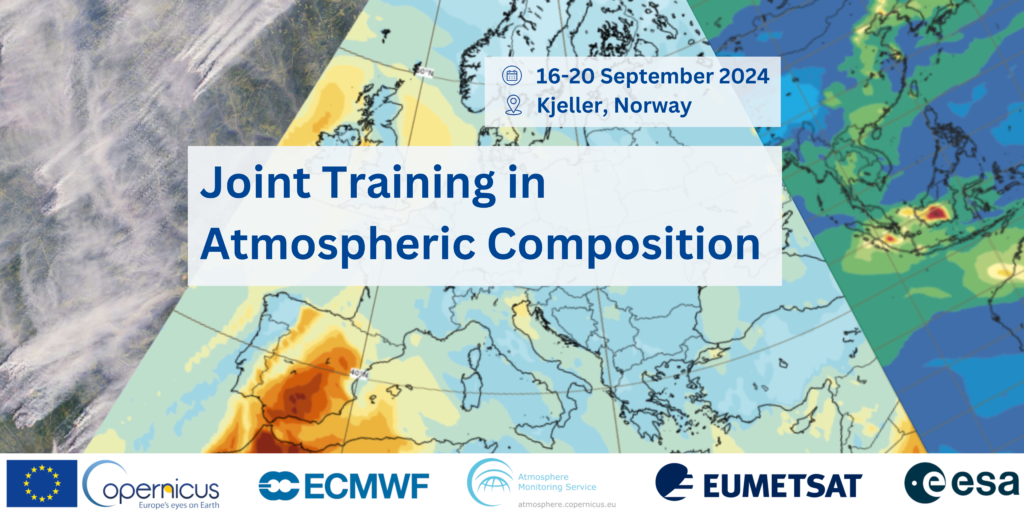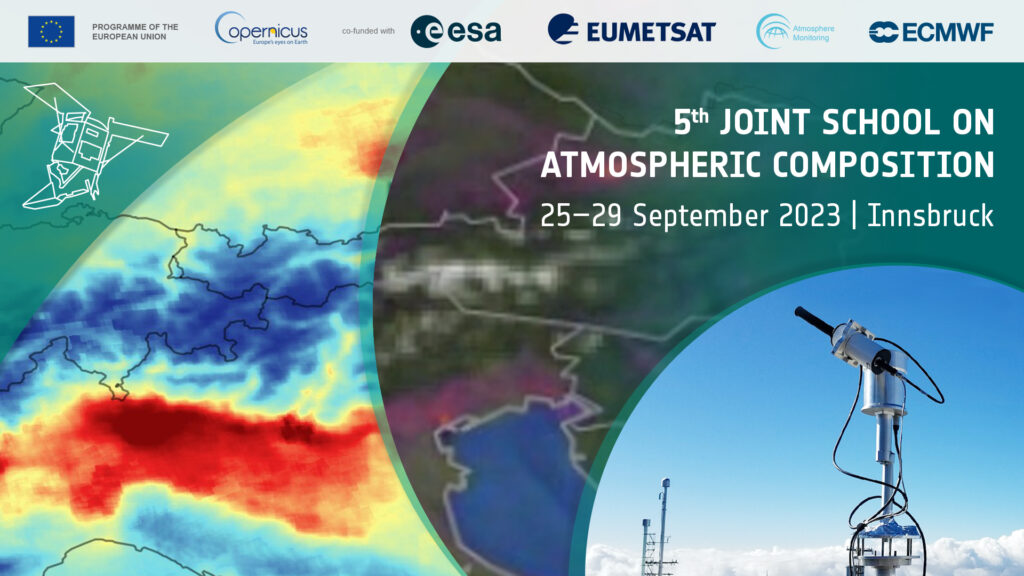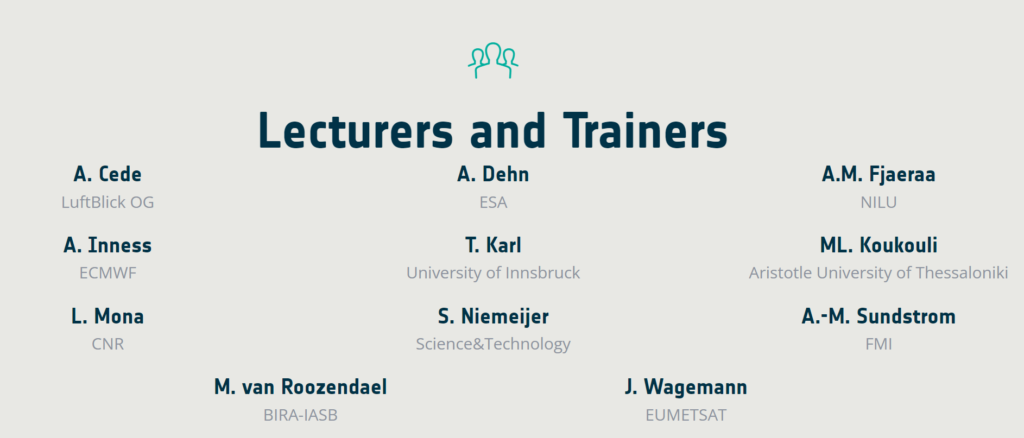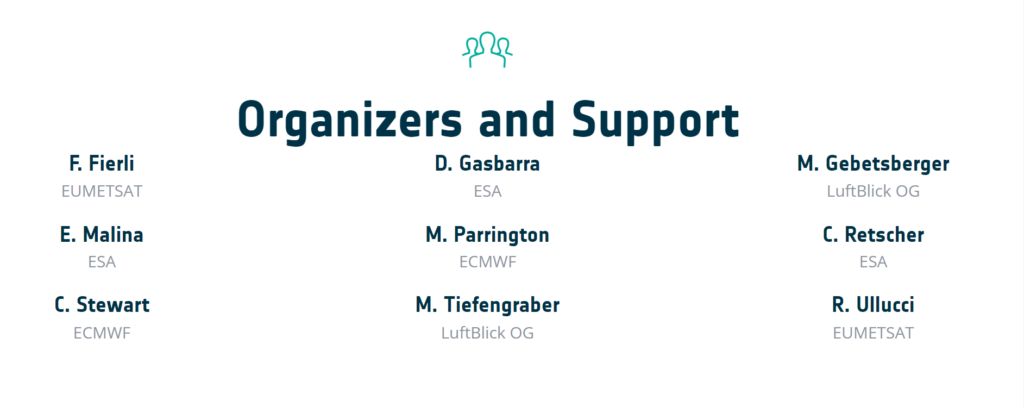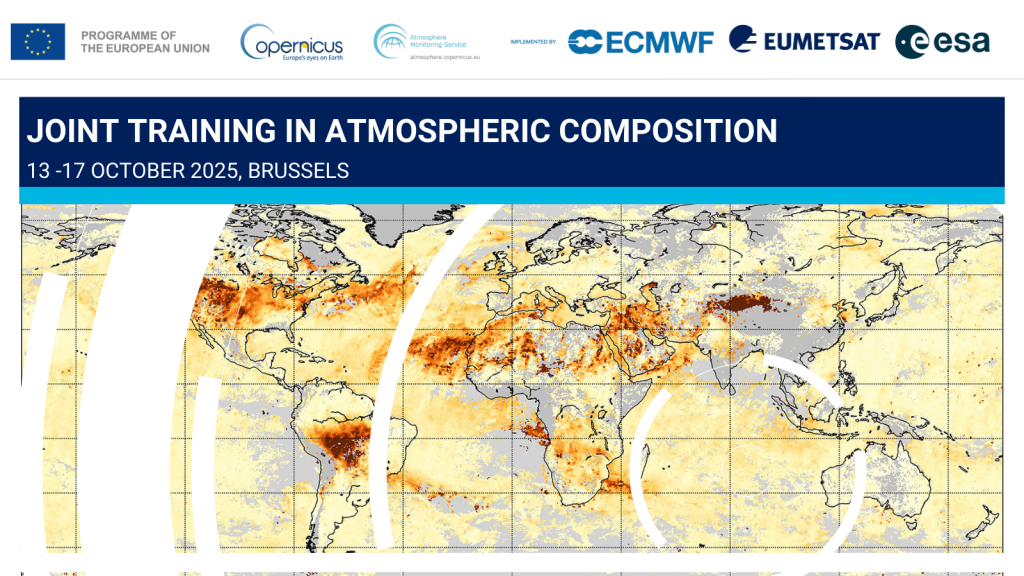
The European Organisation for the Exploitation of Meteorological Satellites (EUMETSAT), the European Space Agency (ESA), and the European Center for Medium-Range Weather Forecasts (ECMWF) with the Copernicus Atmosphere Monitoring Service (CAMS) are organising the seventh joint training course on Atmospheric Composition.
The course will take place in Brussels from 13 to 17 October 2025 hosted by the Royal Belgian Institute for Space Aeronomy BIRA-IASB . Online lectures will precede the onsite training. While the course week at BIRA-IASB will be reserved to selected candidates, the online phase will be open to all interested participants.
Format:
- 1-2 & 9-10 October 2025: online lectures (open to all). Two webinars on each day of lecture, in the morning 10:00 – 11:00 CET and in the afternoon 14:00-15:00 CET.
By signing up at this link you will receive the instructions on how to join the open lectures.
–> Program – online lectures - 13-17 October 2025: onsite training at BIRA-IASB in Brussels (for selected participants only)
–> UPDATED: Program – onsite training
Objectives of the training
The school will present the state-of-the-art in atmospheric composition monitoring and modelling with a focus on chemistry and climate.
It aims to provide an end-to-end overview of observations, remote sensing and modelling enhancing the capacity to access and analyse state-of-the-art datasets.
The course also aims to foster collaboration amongst participants from multiple countries and backgrounds and encourage the development of individual and team projects using the data, resources and methodologies presented.
Target audience
The course is targeted to post-graduate level students, researchers, professionals or anyone interested in furthering their knowledge of atmospheric composition monitoring and modelling and developing their practical skills in data handling.
Some basic background in physics, chemistry, mathematics and computing is assumed, and elementary familiarity with Python programming would be beneficial to make the most of the training.
Whilst the onsite training is limited to around 30 participants, the online lectures preceding the onsite phase will be streamed to a wider audience.
When selecting candidates for the on-site training, participants from Copernicus contributing countries and member states of ESA and EUMETSAT will be given preference. Students from all other countries are also welcome to apply, subject to availability of space.
Financial support (for accommodation in Brussels) will be available upon request for a limited number of participants. Priority will be given to candidates from Copernicus contributing countries or working on an EU project.
Topics of the training
Whilst the topics of the training cover the main processes involved in atmospheric composition monitoring and modelling, the focus this year will be more on Advanced Atmospheric Composition Products & Applications with an emphasis on aerosols.
The main topics of the training include the following:
- Atmospheric processes: aerosols, secondary organic aerosol production, associated chemical species, air quality.
- Modelling: Global/regional; analysis / re-analysis / forecast; bias correction & downscaling; Data Assimilation.
- Emissions: Inventories, inverse modelling (including aerosol precursors).
- Observations: Spaceborne, in-situ, remote sensing retrievals, methods and analysis, exploitation.
- Operational applications and services: Policies; applications & services.
| Lecturers and speakers | |
| Melanie Ades, ECMWF-CAMS Henk Eskes, KMNI Federico Fierli, EC Otto Hasekamp, SRON Alex Hoffmann, ESA MariLiza Koukouli, Univ. of Thessaloniki Rasmus Lindstrot, EUMETSAT | Glenn-Michael Oomen, BIRA-IASB Samuel Rémy, HYGEOS Christian Retscher, EC Viktoria Sofieva, FMI Jenny Stavrakou, BIRA-IASB Anu-Maija Sundström, FMI Nicolas Theys, BIRA-IASB Sophie Vandenbussche, BIRA-IASB |
Organizers and Support
D. Gasbarra (ESA), D. Leskow-Czyżewska (EUMETSAT), E. Malina (ESA), M. Parrington (ECMWF), C. Stewart (ECMWF), R. Ullucci (EUMETSAT).
Presentations and Recordings – Online lectures
1st October
10:00 CEST
Overview information on atmospheric aerosols and their global modeling, Samuel Rémy, HYGEOS
–> Watch the recording on YouTube
14:00 CEST
Mineral dust AOD and profiles retrieved from satellite thermal infrared observations by IASI, Sophie Vandenbussche, BIRA-IASB
2nd October
10:00 CEST
Aerosol assimilation, Melanie Ades, ECMWF-CAMS
–> Watch the recording on YouTube
14:00 CEST
Aerosol monitoring from Sentinel-4, Sentinel-5 and 3MI: Instruments overview and data products, Rasmus Lindstrot, EUMETSAT
–> Watch the recording on YouTube
9th October
10:00 CEST
EarthCARE, Alex Hoffmann, ESA
–> Watch the recording on YouTube
14:00 CEST
Stratospheric aerosols, Viktoria Sofieva, FMI
–> Watch the recording on YouTube
10th October
10:00 CEST
Inversion of sources and application to pyrogenic emissions and organic aerosol precursors, Jenny Stavrakou, BIRA-IASB
–> Watch the recording on YouTube
14:00 CEST
Aerosol remote sensing from polarimetric measurements, Otto Hasekamp, SRON
–> Watch the recording on YouTube
How to apply for the onsite training
** Applications closed on 29th June**
Please submit your application by 29th June on the EUMETSAT training platform at this link
If you already have an account on the platform, follow the link to submit your application form. Otherwise, please make sure you create an account, more information can be found in the course announcement on the EUMETSAT training platform.
– 29 June 2025: deadline for registrations at 24:00 CEST.
– Mid July 2025: notification to selected participants.
Sunday 22nd of June, 15:30-16:50
TUTORIAL - Atmospheric Composition Training at the Living Planet Symposium:
A brief taster of the annual ESA-ECMWF-EUMETSAT joint Atmospheric Composition Training through a series of tutorials and demonstrations.
For more information, visit the LPS program page.


